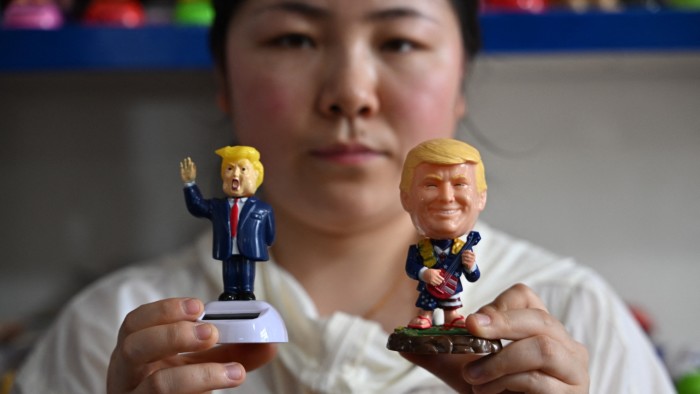Donald Trump’s tariff war has been wreaking havoc in global markets, but among exporters in China’s “trinket town” — the eastern city of Yiwu famous for making everything from Christmas trees to Donald Trump campaign caps — the mood is more of stoic defiance than panic.
Amid government invocations of late dictator Mao Zedong that are intended to project national strength, Chinese business people on the front lines of the trade war said they were confident their nation would prevail.
“Trump wants to steal a slice of China’s pie,” said exporter Kenny Qi in his small store festooned with “Make American Great Again” T-shirts in a vast Yiwu trade exhibition centre.
But Qi said Trump got a shock when Beijing retaliated with its own 125 per cent tariffs this week. He predicted the US president, whose visage glowered at him from a Maga T-shirt above his desk, would back down “in half a month at most”.
Trump’s new duties on Chinese goods are more than twice the 60 per cent tariffs he threatened during his election campaign — a level that many economists had at the time considered a worst-case scenario.
Beijing has stepped up its nationalist rhetoric to steel the public for the economic fallout from a hard decoupling with the US. Foreign ministry spokesperson Mao Ning posted on the social media site X a video of Mao giving a speech during the 1950-53 Korean war, when Chinese soldiers fought against US-led UN forces.
“No matter how long this war is going to last, we’ll never yield, we’ll fight until we completely triumph,” then-chairman Mao says in the clip.
We are Chinese. We are not afraid of provocations. We don’t back down. 🇨🇳 pic.twitter.com/vPgifasYmI
— Mao Ning 毛宁 (@SpoxCHN_MaoNing) April 10, 2025
In another post, the spokesperson quoted Mao as saying in 1964: “The US intimidates certain countries, stopping them from doing business with us. But America is just a paper tiger. Don’t believe in its bluff. One poke, and it’ll burst.”
Beijing has accompanied its retaliatory tariffs with a host of other measures, vowing to reduce access for Hollywood movies and warning citizens against travelling to the US or studying there. Meanwhile, state media have pumped out stories about how Americans are struggling to afford basic necessities. The Communist party nationalist tabloid Global Times described one shortage as an “‘egg crisis’ sweeping the nation”.
“The news says Americans are already scrambling to buy eggs, flour and cooking oil,” said Nie Ziqin, who runs a store in Yiwu offering Halloween decorations intended for sale to the US and other countries.

Nie, who came to Yiwu more than 20 years ago aged 16 as a factory worker and now runs her own plant employing more than 100 people, admitted the tariff war had “shocked and disappointed” her after decades of doing business with the US.
She said she had refused US customers’ requests to slash prices after the tariff war broke out, even though cancelled orders have forced her to lay off more than 10 per cent of her workers.
“Chinese people think differently from foreigners. We save money, and we can survive on our savings for one, two, even three years. Foreigners spend what they earn,” she said, proudly showing off a premium product for the US market — a zombie mask featuring hand-painted blood spatterings.
“We Chinese will win any protracted war. Chinese people are hard-working, diligent and can ‘eat bitterness’,” she said, using a phrase favoured by Chinese President Xi Jinping.
But while producers in Yiwu also export to Europe and the developing world, making them relatively well positioned to weather trade war with the US, many larger manufacturers in other parts of China are more exposed.
In central China’s Zhengzhou city, where Apple makes most of its iPhones, many are worried. “Everything is normal for now, but China is under great pressure,” said a worker on a break from an iPhone assembly line owned by Apple contractor Foxconn.

Apple has increased the number of flights carrying iPhones from India to the US following Donald Trump’s tariff blitz, and employees at the Zhengzhou plant said they expected shifts to be reduced.
“I think the company will cut production, it may lead to less work,” said the worker.
Foxconn did not immediately respond to a request for comment.
A salesperson at a logistics company in Zhejiang, the wealthy coastal province that includes Yiwu, said even if direct trade with the US was reduced and exporters diversified, the American market would remain important.
“It remains the largest market in the world, and its consumer power and market scale are unmatched,” the person said.
In a sign of solidarity between producers in China’s normally cut-throat market, Yiwu-based camping goods exporter Zhu Yuelai said his industry association was trying to help large manufacturers in other parts of the country who were more reliant on the US.
Yiwu producers were opening their customer networks, many of them in developing countries, to those larger companies even though they had in the past looked down on the city’s small and medium-sized exporters, Zhu said.
While many Chinese businesses are reeling from the trade war, Qi, the Maga merchandise maker, brushed off any suggestion his might suffer.
Trump supporters, he said, were willing to pay any price for items bearing the image of their beloved president — and US suppliers were making such a huge profit on them that they could afford to partially absorb the tariff impact.
A Trump baseball cap, for instance, cost only Rmb7.50 ($1) to produce. Tariffs might raise that cost to Rmb20, but the caps were being sold for $50 in the US.
“American sellers could even use the tariffs as an excuse to raise the price to $60 — yet the extra cost will still be borne by the US consumers,” said Qi.
Additional reporting by Edward White in Shanghai and Chan Ho-him and Gloria Li in Hong Kong


